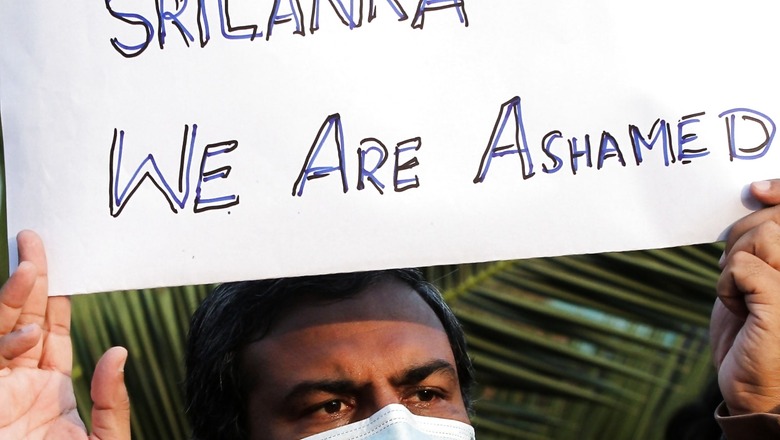
views
Islam, notwithstanding the heat and scrutiny it faces, the gory and loathsome past of intolerance, disapproval, and holocaust, has thrived and treaded since its advent and continues to engage the world, raise eyebrows, and steal the show—geopolitical, diplomatic, social, cultural, and political. The recent gruesome lynching of a top Sri Lankan manager of a garment factory in Sialkot district, Priyantha Kumara, an individual belonging to one of the minorities of Pakistan, whose body was torched by alleged supporters of a fundamentalist Islamist party, should not come as a surprise to anyone with even an ounce of acquaintance with world history, so to speak, which attacked the facility in Pakistan’s Punjab province over blasphemy allegations.
A Punjab Police official told news agency PTI that Mr. Kumara allegedly tore a poster of the hardliner Tehreek-e-Labbaik Pakistan (TLP) on which Quranic verses were inscribed, which bore the name of the last and most contentious Islamic Prophet Muhammad, and threw it in the dustbin. Hundreds of men amassed outside the plant from surrounding neighbourhood, incensed by the blasphemy incident. The late Kumara can be seen being tossed to the ground and hundreds tearing his clothes and severely abusing him in footage that has gone viral on social media. He was tortured to death before being charred to death. Several people in the throng were also observed taking selfies with his lifeless body. In the video, the fuming and fierce mob can be heard chanting ‘Nara e Taqbeer’ and ‘Labbaik Ya Rasool Allah’. ‘Labbaik Ya Rasool Allah’ essentially means ‘Here I am at your service, O Messenger of Allah’.
Other slogans that could be heard as the fanatics burnt the man to death were “gustakh-e-nabi ki ek hi saza, sar tan se juda, sar tan se juda”. It is noteworthy here that after negotiating a secret agreement with the same TLP, the Imran Khan government recently lifted a ban on it, freeing its head, Saad Rizvi, and over 1,500 Jihadis charged with terrorism. In exchange, the TLP concluded its week-long sit-in in Punjab by dropping its demand that the French ambassador be expelled over the subject of blasphemous drawings in France.
Blasphemy in Islam is an impious utterance or action concerning God, but is broader than in normal English usage, including not only the mocking or vilifying of attributes of Islam but denying any of the fundamental beliefs of the religion, as per Wikipedia. Blasphemy lawsuits are growing more common as a tool of persecuting minorities in countries such as Pakistan, Saudi Arabia, and Indonesia.
While these archaic blasphemy laws in modern Islamic countries have been inherited through one of two broad routes: as residues of European colonialism in Christian Europe (where they were used to suppress opposition and impose the church’s power), they were exported to Muslim-majority countries through British imperialism, or as products of the 20th-century ‘Arabization’ of the Muslim world in the manner of the Gulf states.
Raif Badawi, a Saudi writer, dissident, and an activist, as well as the creator of the website Free Saudi Liberals, remains incarcerated in Saudi Arabia for alleged blasphemy of being an atheist. The former governor of the Indonesian capital, Jakarta, Basuki Tjahaja Purnama, known as Ahok, happened to be the first non-Muslim (Christian) governor in 50 years, was slapped with a 2-year prison sentence for blasphemy because he reprimanded claims by clerics that the Quran mandates Muslims to vote for a Muslim over a non-Muslim. Junaid Hafeez, a Pakistani university instructor, was sentenced to death in December 2019 after serving six years in prison. Blasphemy, notably insulting Prophet Muhammad on Facebook, was the charge. It is not necessary to go back decades or centuries, but as recently as late October 2021, when a slew of violence was unleashed upon Bangladeshi Hindus during the Durga Puja festivities, sparking outrage and wrath worldwide—the violence was triggered by a photo of the Quran laying at the feet of the idol of Bhagwan Hanuman in Comilla district on social media, which quickly went viral, prompting provocateurs to call on Muslims to rise up as it turned out, invariably in most of the cases, the perpetrators were both Muslims, debunking the claim that Hindus had committed blasphemy.
According to the Center for Social Justice, at least 1,500 people were accused of blasphemy between 1987 and 2017, and at least 75 people implicated in blasphemy claims were killed in Pakistan. According to a report by a US government advisory council, Pakistan invoked blasphemy laws more than any other country on the planet. Blasphemy accusations have resulted in violence against minorities, particularly Hindus, in Pakistan. Several people have been lynched in recent years after being accused of blasphemy. According to rights activists, Pakistan’s anti-defamation laws, which include the death sentence, are said to be frequently used to settle personal conflicts in the Muslim-majority country.
About 32 out of the 71 countries, which have made blasphemy unlawful are Muslim majority. The severity of the penalties and the extent to which these laws are enforced vary. In Iran, Pakistan, Afghanistan, Brunei, Mauritania, and Saudi Arabia, blasphemy is punishable by death. Italy has the worst blasphemy laws among non-Muslim-majority countries, with a maximum sentence of three years in prison. Apostasy is illegal in half of the world’s 49 Muslim-majority countries, which means that quitting Islam might land one in trouble.
There can be no debate or disproval of the fact that there, of course, are circa 50 Islamic countries in the world where Islam is the state religion and these very “Islamic states” fail the test of religious tolerance, being Muslim-majority countries, whether governed by Sharia and the Hadith or any “secular constitution”. Truth be told, and truth be told without equivocation, when the Azaan is played five times a day over loudspeakers and the words “La IlahaIllallah” (لاإلهإلاالله), or “There is no god but Allah” are declared – it surely tantamount to blasphemy when all religions of the world except Islam are scorned and demeaned five times a day. There can be no place for anarchy or mobocracy in the 21st century. Islamic scholars, who at least claim to be so, have a call to make: either put their heads together to retrospect, contemplate, and deliberate on their prospects, lest they find solace in turning a blind eye to the real malice within their community, which is now endangering the entire civil society.
Even if one avoids the chapters and lessons of the bloody Islamic history – damned, barbaric, and gruesome – lurking around infidels, believers, blasphemy, and apostates, there have been ample stern arguments expounded in this very article to assert and realise this plain fact.
Yuvraj Pokharna is a Surat-based educator, columnist, and social activist. The views expressed in this article are those of the author and do not represent the stand of this publication.
Read all the Latest Opinions here
















Comments
0 comment